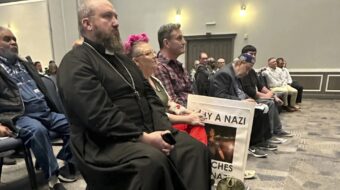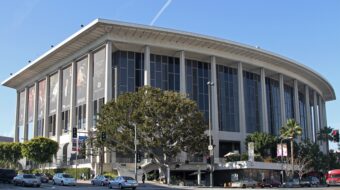The issue of immigration was brought to the forefront recently by Arizona’s discriminatory immigration law SB 1070, which would require police and other public officials to ask all or any “illegal”-looking people (i.e. Latino-looking) to show their IDs. This demonstrates an attitude oriented towards criminalizing immigrants in general and a hostile outlook towards Hispanics in particular.
The anti-immigrant attitude was also evident in Utah a few months ago when a list was published and widely distributed with the names and personal information of 1,300 supposedly undocumented immigrants concerning which some were actually born in the U.S., but happened to have Spanish names. The people that created the list signed it “anonymous”, i.e. cowards.
At the same time, many on the right-wing side of American politics are targeting the 14th Amendment, which states “all persons born or naturalized in the United States, and subject to the jurisdiction there of, are citizens of the United States and of the states where in they reside.” The right-wing has dubbed babies of immigrants as “anchor babies” and, in effect, wishes to criminalize babies!
Understandably, there is a heightened climate of fear that many immigrants experience due to such extreme animosity being directed toward them.
Immigrants have been a perennial scapegoat of the right-wing. Indeed, they make easy targets as they often have little or no political clout and generally cannot fight back through legal means.
Racism, I believe, is one of the fundamental components of the hostility towards immigrants.
(As an aside, I don’t really like to use the word “race” or overly emphasize “racism” as a factor, especially as I believe that “race” is a misnomer in that all of us are of the same race, the human race. I use it only because it is in the common vernacular, while often used to point out an imaginary great divide linked to ethnic variance and supposed negative traits that are assigned to people who superficially appear different.)
My interest and activism on behalf of this and similar issues began about 1980 when I lived in California. Then I was involved with the anti-interventionist movement that was against U.S. policies of backing right wing dictatorships, and training militaries and death squads from El Salvador and Guatemala, as well as throughout much of Latin America. I was also active in CISPES, the Committee in Solidarity with the People of El Salvador.
At the time, the group was opposed to U.S. operations that supported Salvadoran government leaders and armed forces involved in widespread imprisonment, torture and murder of innocent civilians to prop up a corrupt regime favoring U.S. business interests. Due to the resultant turmoil in their land, many Salvadorans, throughout the 80s and into the 90s, came north as refugees and were helped by the sanctuary movement that sheltered many of these undocumented people.
Movement members understood that, if the refugees were deported to El Salvador, they would likely be found and killed by the Salvadoran government/death squads whose commanders the U.S. funded and trained at the School of the Americas in Georgia. In relation, El Salvador had 75,000 killed and, concurrently, Guatemala had 200,000 civilians killed in the 80s and 90s.
All considered, many refugees, aside from those from El Salvador, came to the U.S. during that period. Yet because of our government’s ratification of their nations’ brutal regimes, our public officials showed indifference to their story and hostility to their needs at the time.
Later on when Newt Gingrich and the Republicans introduced their Contract with America, many of us rejected its viewpoints. We noted, amongst other unacceptable positions, its ratification of a strong anti-immigrant stance, one that instilled a great deal of anxiety among many immigrants, including my wife who is from Thailand.
Understandably, many immigrants from all parts of the world feared deportation in relation to this ugly contract. So they worked to quickly obtain U.S. nationality and, representing a fairly common mix for that era, there were about 300 new citizens comprised of approximately 70% Latin Americans, 20% Asians, and 10% Europeans and Africans during one of the many citizenship ceremonies that I remember taking place then.
Meanwhile, I, have a positive attitude about immigration and the ethnic mix of our country. I view both as a good occurrence, especially as newcomers and people with diverse cultural backgrounds bring a fresh perspective to many varied issues that concern us all. They also often provide valuable goods and services that vitalize the economy and strengthen community ties.
Brian McAfee is a freelance writer and researcher currently living in Muskegon Heights, Mich.












Comments